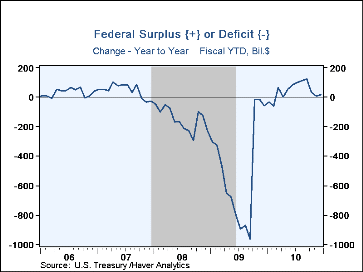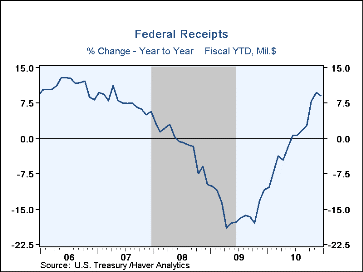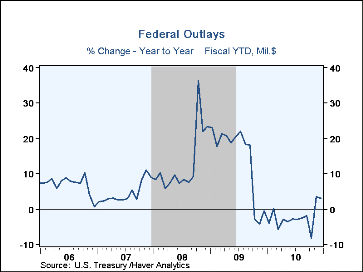 Global| Jan 12 2011
Global| Jan 12 2011U.S. Budget Deficit Narrows Slightly In Q1 FY'11
by:Tom Moeller
|in:Economy in Brief
Summary
The U.S. Government's budget deficit during the first quarter of FY 2011, beginning last October, totaled $370.8B, according to figures released today by the U.S. Treasury and the Office of Management and Budget. That was slightly [...]
 The U.S. Government's budget deficit during the first quarter of FY 2011,
beginning last October, totaled $370.8B, according to figures released today by
the U.S. Treasury and the Office of Management and Budget. That was slightly
narrower than last year's $388.1B and its percentage of GDP similarly fell
slightly to roughly 9.9% from 10.5% in last year's first quarter. For March
alone, the deficit narrowed to $80.0B from $91.4B last year, slightly
more-than-expected.
The U.S. Government's budget deficit during the first quarter of FY 2011,
beginning last October, totaled $370.8B, according to figures released today by
the U.S. Treasury and the Office of Management and Budget. That was slightly
narrower than last year's $388.1B and its percentage of GDP similarly fell
slightly to roughly 9.9% from 10.5% in last year's first quarter. For March
alone, the deficit narrowed to $80.0B from $91.4B last year, slightly
more-than-expected.
Receipts grew by 9.0% in Q1 '11 in a reversal of the prior year's decline. Leading the turn was a nearly one-quarter gain in individual income taxes. Earlier declines in employment levels have stabilized. Moreover, rental, proprietors', and dividend income each rose. Corporate income taxes rose 5.9% with higher profitability.
Reported outlays increased a modest 3.1% y/y. The gain in national defense spending picked in Q1 to 6.4% but spending elsewhere either slowed or declined. Notably, though the unemployment rate has not declined significantly, claims for unemployment insurance have eased.
Haver's basic data on Federal Government outlay and receipts and summary presentations of the Budget from both OMB and CBO are contained in USECON. Considerable detail is given in the separate GOVFIN database.
The Federal Reserve's latest Beige Book covering regional economic conditions can be found here.
| US Government Finance | Q1 2011 | Q1 2010 | FY 2010 | FY 2009 | FY 2008 |
|---|---|---|---|---|---|
| Budget Balance | $-370.8B | $-388.1B | $-1,294.1B | $-1,417.1B | $-454.8B |
| as a percent of GDP | -9.9 | -10.5 | -8.9 | -10.0 | -3.2 |
| Net Revenues (Y/Y % Change) | 9.0 | -10.9 | 2.7 | -16.6 | -1.7 |
| Individual Income Taxes | 23.2 | -18.6 | -1.8 | -20.1 | -1.5 |
| Corporate Income Taxes | 5.9 | -32.6 | 38.5 | -54.6 | -17.8 |
| Social Insurance Taxes | -2.5 | -2.2 | -2.9 | -1.0 | 3.5 |
| Net Outlays (Y/Y % Change) | 3.1 | -0.5 | -1.8 | 18.2 | 9.1 |
| Nat'l Defense | 6.4 | 2.7 | 5.0 | 7.6 | 11.8 |
| Health | 10.3 | 23.9 | 10.4 | 19.1 | 5.4 |
| Medicare | 4.7 | 5.8 | 5.0 | 10.1 | 4.1 |
| Income Security | -0.9 | 33.6 | 16.9 | 24.9 | 16.8 |
| Social Security | -11.4 | 29.1 | 3.5 | 10.7 | 5.3 |
| Interest | 8.5 | -4.4 | 3.3 | -24.5 | 6.3 |
Tom Moeller
AuthorMore in Author Profile »Prior to joining Haver Analytics in 2000, Mr. Moeller worked as the Economist at Chancellor Capital Management from 1985 to 1999. There, he developed comprehensive economic forecasts and interpreted economic data for equity and fixed income portfolio managers. Also at Chancellor, Mr. Moeller worked as an equity analyst and was responsible for researching and rating companies in the economically sensitive automobile and housing industries for investment in Chancellor’s equity portfolio. Prior to joining Chancellor, Mr. Moeller was an Economist at Citibank from 1979 to 1984. He also analyzed pricing behavior in the metals industry for the Council on Wage and Price Stability in Washington, D.C. In 1999, Mr. Moeller received the award for most accurate forecast from the Forecasters' Club of New York. From 1990 to 1992 he was President of the New York Association for Business Economists. Mr. Moeller earned an M.B.A. in Finance from Fordham University, where he graduated in 1987. He holds a Bachelor of Arts in Economics from George Washington University.
More Economy in Brief
 Global| Feb 05 2026
Global| Feb 05 2026Charts of the Week: Balanced Policy, Resilient Data and AI Narratives
by:Andrew Cates








